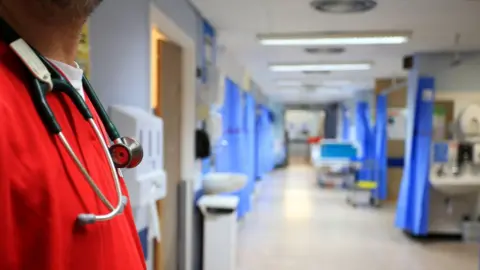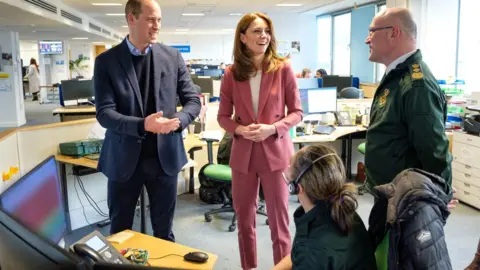Coronavirus: Thousands of extra hospital beds and staff
 PA Media
PA MediaThe NHS has struck a deal with private hospitals to acquire thousands of extra beds, ventilators and medical staff to fight the coronavirus outbreak.
An extra 8,000 hospital beds across England, nearly 1,200 ventilators and almost 20,000 fully qualified staff will be available from next week.
It comes as the number of people in the UK to die with coronavirus rose to 233.
The agreement will see the private sector reallocate almost its entire national hospital capacity to the NHS.
The extra resources will also help the NHS deliver other urgent treatments.
According to the latest figures, there are more than 5,000 confirmed cases of coronavirus in the UK.
The number of people with coronavirus who have died is now 220 in England, seven in Scotland, five in Wales and one in Northern Ireland.
The most recent 53 deaths in England were people aged 41 to 94 who had underlying health conditions, NHS England said.
In London, the extra resources includes more than 2,000 hospital beds and more than 250 operating theatres and critical beds.
The additional staff includes 10,000 nurses, more than 700 doctors and more than 8,000 other clinical staff, who will be joining the health service to help manage an expected surge in cases, said NHS England.
 PA Media
PA MediaChief executive Sir Simon Stevens hailed the deal with the private sector.
He said: "We're dealing with an unprecedented global health threat and are taking immediate and exceptional action to gear up.
"The NHS is doing everything in its power to expand treatment capacity and is working with partners right across the country to do so."
Under the terms of the deal, the private sector will be reimbursed at cost, meaning no profit will be made for doing so.
"Open book" accounting and external auditors will verify the public funds being deployed.

Unprecedented mass purchasing

The NHS often uses private sector facilities when the need arises.
But the mass purchasing of these resources is unprecedented.
The ventilators will be crucial in helping the sickest.
Just over 4% of people who developed symptoms are likely to need hospital care - and a third of those intensive care support.
There are nearly 4,000 adult critical care beds in England currently.
These extra ventilators will add to the hundreds freed up by the move to cancel routine operations from April, as well as steps to source others from elsewhere including the Ministry of Defence and old and new stocks.

David Hare, chief executive of the Independent Healthcare Providers Network, said: "We have worked hand-in-hand with the NHS for decades and will do whatever it takes to support the NHS in responding to this pandemic."
He added the independent sector "stands ready" to maintain that support for as long as needed.
Shortly after the NHS announcement, Spire Healthcare released a statement confirming it had signed up to assist NHS England for a minimum of 14 weeks.
The independent UK hospital group said it would spend the first week preparing staff and facilities before making all its 35 hospitals in England available to the NHS from 30 March.
It added that it would be suspending all non-urgent elective surgery for patients over the age of 70 and vulnerable patients from 5:00 GMT on 20 March.
The NHS deal comes as a consultant warned that frontline NHS staff risked "cross infecting everybody" because they are not getting the recommended protective equipment.
The face mask, short gloves and apron worn by NHS staff is far short of the World Health Organization recommendations, said Dr Lisa Anderson of St George's Hospital in London.

- A SIMPLE GUIDE: What are the symptoms?
- GETTING READY: How prepared is the UK?
- MAPS AND CHARTS: Visual guide to the outbreak
- PUBLIC TRANSPORT: What's the risk?

Earlier this week, professional health bodies wrote to 65,000 former doctors and nurses who have left the NHS in the last three years, asking them to rejoin the workforce.
Health Secretary Matt Hancock welcomed Saturday's announcement and praised the "heroes returning to the front line".
On Tuesday, NHS England announced that its hospitals across the country would be taking a range of actions to prepare, including freeing up 30,000 of the overall 100,000 beds available by postponing non-urgent operations and providing care in the community for those who are fit to be discharged.
The NHS is also sourcing up to 10,000 beds in independent and community hospitals, which this deal largely now delivers.
In other developments:
- Shoppers have been told to "be responsible" and think of others such as NHS workers, after widespread panic-buying. The government also said there is no shortage of food
- John Lewis is the latest High Street shop to close all of its stores. However, Waitrose shops will stay open, apart from those in department stores at Watford, Southampton and Bluewater
- Sandwich chain Pret a Manger has announced the closure of all its 400 UK outlets from Saturday evening
- Trade unions and a former minister have called for financial help for self-employed workers in the UK. It comes after the government promised to pay 80% of salaries of staff kept on by employers
- The Big Issue magazine - which sells around 60,000 copies every week - will stop being sold from next week
- Homeless people will be housed in hotels in central London to protect them against the virus, the Mayor of London Sadiq Khan said
- Children are putting up paintings of rainbows in their windows after schools closed on Friday
- A hotel in the Scottish Highlands which laid off staff and asked them to leave their accommodation has said the decision was an "admin error"
- The death toll passes 11,000 worldwide, as confirmed cases of coronavirus pass 280,000
- In Italy, deaths continue to spiral as figures show another 793 people with coronavirus have died in the last 24 hours, bringing the total to 4,825
- Spain also saw a record number of deaths in one day, a rise of 324 bringing its total to 1,326
